World
Zelenskiy says he is willing to quit presidency if it means peace in Ukraine
The Ukrainian president also said he wanted to see Trump as a partner for Ukraine and more than a simply a mediator between Kyiv and Moscow.

Ukraine’s President Volodymyr Zelenskiy said on Sunday he was willing to give up his position if it meant peace in Ukraine, adding that he could exchange his departure for his country’s entry into the NATO military alliance, Reuters reported.
“If (it means) peace for Ukraine, if you really need me to leave my post, I am ready,” an irritated-looking Zelenskiy said when asked during a press conference whether he was ready to leave his post if it meant securing peace.
“I can exchange this for NATO (membership), if that condition is there, immediately,” the president added.
U.S. President Donald Trump has pushed for elections to take place in Ukraine, having branded Zelenskiy a “dictator”, an apparent reference to the Ukrainian leader’s official five-year term running out in 2024. Russia has cited this in the past to assert that he is an illegitimate leader, read the report.
Ukrainian legislation prohibits holding elections during a state of martial law, which Ukraine declared the day Russia invaded in February 2022. Trump also falsely claimed that Zelenskiy has an approval rating of four percent.
“I am not going to be in power for decades, but we will not allow Putin to be in power over the territories of Ukraine either,” Zelenskiy said on Sunday, referring to Russian President Vladimir Putin.
A poll released this week put Zelenskiy’s approval ratings at 63%, and he made reference to this when talking about Trump’s claims on Sunday, calling his false statements “dangerous”.
“I believe it’s not a mistake, it’s misinformation that has an impact,” Zelenskiy said.
Zelenskiy said earlier this week Trump was in a “disinformation bubble”, angering the U.S. President and his team. On Sunday, he sought to justify the earlier comments.”(The information) about four percent of Ukrainians supporting me is one of the signals spread by the Russians, that’s why I said it was a disinformation attack, I didn’t say it was President Trump,” Zelenskiy said on Sunday.
Trump’s criticism of Zelenskiy came as relations between the two leaders deteriorated sharply in recent weeks.
Zelenskiy opposes the idea of elections in a full-scale war, a position backed by his major domestic political opponents.
The Ukrainian president also said he wanted to see Trump as a partner for Ukraine and more than a simply a mediator between Kyiv and Moscow.
“I really want it to be more than just mediation… that’s not enough,” he told a press conference in Kyiv.
Trump has said Ukraine should give the U.S. $500 billion in critical raw materials as payback for aid which Kyiv has already received from the previous Joe Biden administration.
Zelenskiy declined to sign a detailed U.S. proposal last week that would have seen Washington receiving 50% of Ukraine’s critical minerals, which include graphite, uranium, titanium and lithium, the latter a key component in electric car batteries, Reuters reported.
He has said he wants to do a deal, but that it should offer security guarantees for Ukraine in return.
On Friday, he said U.S. and Ukrainian teams were working on a deal and Trump said he expects a deal will be signed soon.
On Sunday, Zelenskiy said at the press conference that he rejected the idea that Ukraine owed the U.S. $500 billion.
“There cannot be (any) format which makes us debtors for the old (aid given).”
Zelenskiy said earlier this week that Washington had supplied his country with $67 billion in weapons and $31.5 billion in direct budget support throughout the nearly three-year war with Russia.
“I will not sign what 10 generations of Ukrainians will be repaying,” Zelenskiy said of the minerals deal.
Ukraine’s economy minister Yuliia Svyrydenko said on Sunday the 18% of Ukraine under Russian occupation contained about $350 billion of critical raw materials, adding that Ukraine is conducting additional geological research to update decades-old information, read the report.
The president’s chief of staff, Andriy Yermak, said on Sunday that he had held constructive new talks with senior U.S. officials on a deal to develop Ukrainian minerals.
“We are moving forward with our work. This was a constructive discussion,” Yermak wrote on Telegram.
World
Israel kills Hezbollah official in deadly Beirut airstrike

An Israeli airstrike killed four people including a Hezbollah official in Beirut’s southern suburbs on Tuesday, a Lebanese security source said, further testing a shaky ceasefire between Israel and Iran-backed Hezbollah.
The Israeli military said the official – Hassan Bdeir – was a member of a Hezbollah unit and Iran’s Quds Force, and he had assisted the Palestinian group Hamas in planning a “significant and imminent terror attack against Israeli civilians,” Reuters reported.
The Lebanese security source said the target was a Hezbollah figure whose responsibilities included the Palestinian file. The Lebanese health ministry said the strike killed four people – including a woman – and wounded seven others.
It marked Israel’s second airstrike in the Hezbollah-controlled suburb of Beirut in five days, adding to strains on the U.S.-brokered ceasefire that ended last year’s devastating conflict.
The attacks on Beirut’s southern suburbs have resumed at a time of broader escalation in the region, with Israel having restarted Gaza strikes after a two-month truce and the United States hitting the Iran-aligned Houthis of Yemen in a bid to get them to stop attacking Red Sea shipping.
Hezbollah lawmaker Ibrahim Moussawi said the Israeli attack amounted to “a major and severe aggression that has escalated the situation to an entirely different level”.
Speaking in a televised statement after visiting the building that was struck, he called on the Lebanese state to “activate the highest level of diplomacy to find solutions”.
Israeli Foreign Minister Gideon Saar said the eliminated Hezbollah operative posed “a real and immediate threat”. “We expect Lebanon to take action to uproot terrorist organizations acting within its borders against Israel,” he said.
Israel dealt severe blows to Hezbollah in the war, killing thousands of its fighters, destroying much of it arsenal and eliminating its top leadership including Hassan Nasrallah.
Hezbollah has denied any role in recent rocket attacks from Lebanon towards Israel, including one that prompted Israel to carry out an airstrike on the southern suburbs last Friday.
Tuesday’s strike in the early hours appeared to have damaged the upper three floors of a building, a Reuters reporter at the scene said, with the balconies of those floors blown out.
The glass on the floors below was intact, indicating a targeted strike. Ambulances were at the scene as families fled to other parts of Beirut.
There was no advance warning, in contrast to the attack on Friday when the Israeli military announced which building it intended to hit and ordered residents to leave the area.
Lebanese President Joseph Aoun condemned the latest airstrike, calling it a “dangerous warning” that signals premeditated intentions against Lebanon, which would intensify diplomatic outreach and mobilise international allies.
Lebanese Prime Minister Nawaf Salam said the strike was a flagrant breach of a U.N. Security Council Resolution upon which the ceasefire was based, and the ceasefire arrangement.
U.S. BACKS ISRAEL
The ceasefire agreement demanded that southern Lebanon be free of Hezbollah fighters and weapons, that Lebanese troops deploy into the area, and that Israeli troops withdraw.
But each side accuses the other of failing to implement the terms fully. Israel says Hezbollah still has infrastructure in the south, while Lebanon and Hezbollah say Israel is occupying Lebanese soil by not withdrawing from five hilltop positions.
The U.S. State Department said that Israel was defending itself from rocket attacks that came from Lebanon and that Washington blamed “terrorists” for the resumption of hostilities.
“Hostilities have resumed because terrorists launched rockets into Israel from Lebanon,” a State Department spokesperson said in an email, responding to a question from Reuters seeking reaction to Tuesday’s airstrike. Washington supported Israel’s response, the spokesperson said.
The Israel-Hezbollah conflict was ignited when Hezbollah opened fire in support of Hamas at the start of the Gaza war. It escalated in September when Israel went on the offensive, declaring the aim of securing the return home of tens of thousands of people evacuated from homes in the north.
The war uprooted more than a million people and killed at least 3,768 people in Lebanon, according to a Lebanese health ministry toll from November. Dozens more have been reported killed by Israeli fire since the ceasefire.
Lebanon’s figures do not distinguish between civilians and fighters.
During the war, Hezbollah strikes killed 45 civilians in northern Israel and the Israeli-occupied Golan Heights. At least 73 Israeli soldiers were killed in northern Israel, the Golan Heights, and in combat in southern Lebanon, according to Israeli authorities.
World
Trump says Zelenskiy wants to back out of critical minerals deal

U.S. President Donald Trump said on Sunday Ukrainian President Volodymyr Zelenskiy wants to back out of a critical minerals deal, warning the Ukrainian leader would face big problems if he did.
“He’s trying to back out of the rare earth deal and if he does that he’s got some problems, big, big problems,” Trump told reporters.
“He wants to be a member of NATO, but he’s never going to be a member of NATO. He understands that.”
(Reuters)
World
South Korea, China, Japan seek regional trade amid Trump tariffs

South Korea, China and Japan held their first economic dialogue in five years on Sunday, seeking to facilitate regional trade as the three Asian export powers brace from U.S. President Donald Trump’s tariffs.
The countries’ three trade ministers agreed to “closely cooperate for a comprehensive and high-level” talks on a South Korea-Japan-China free trade agreement deal to promote “regional and global trade”, according to a statement released after the meeting.
“It is necessary to strengthen the implementation of RCEP, in which all three countries have participated, and to create a framework for expanding trade cooperation among the three countries through Korea-China-Japan FTA negotiations,” said South Korean Trade Minister Ahn Duk-geun, referring to the Regional Comprehensive Economic Partnership.
The ministers met ahead of Trump’s announcement on Wednesday of more tariffs in what he calls “liberation day”, as he upends Washington’s trading partnerships.
Seoul, Beijing and Tokyo are major U.S. major trading partners, although they have been at loggerheads among themselves over issues including territorial disputes and Japan’s release of wastewater from the wrecked Fukushima nuclear power plant.
They have not made substantial progress on a trilateral free-trade deal since starting talks in 2012.
RCEP, which went into force in 2022, is a trade framework among 15 Asia-Pacific countries aimed at lowering trade barriers.
Trump announced 25% import tariffs on cars and auto parts last week, a move that may hurt companies, especially Asian automakers, which are among the largest vehicle exporters to the U.S.
After Mexico, South Korea is the world’s largest exporter of vehicles to the United States, followed by Japan, according to data from S&P.
The ministers agreed to hold their next ministerial meeting in Japan.
(Reuters)
-

 Business4 days ago
Business4 days ago36 mining contracts inked over the past year: Mines ministry
-

 Latest News4 days ago
Latest News4 days agoDried fruit market in Herat booms ahead of Eid-al-Fitr
-

 Regional4 days ago
Regional4 days agoPowerful quake in Southeast Asia kills several, Myanmar declares state of emergency
-

 Latest News4 days ago
Latest News4 days agoUS may ask for military equipment left behind in Afghanistan: Trump
-

 International Sports4 days ago
International Sports4 days agoLucknow’s six-hitting machine Pooran justifies top order slot
-

 Latest News3 days ago
Latest News3 days agoMore than 70,000 Afghans returned home in third week of March: IOM
-

 Latest News4 days ago
Latest News4 days agoNegotiations with Afghanistan are the only way forward: Pakistan’s ex-PM Khan
-

 Health3 days ago
Health3 days agoGlobal organizations warn of health crisis due to aid cuts in Afghanistan
























